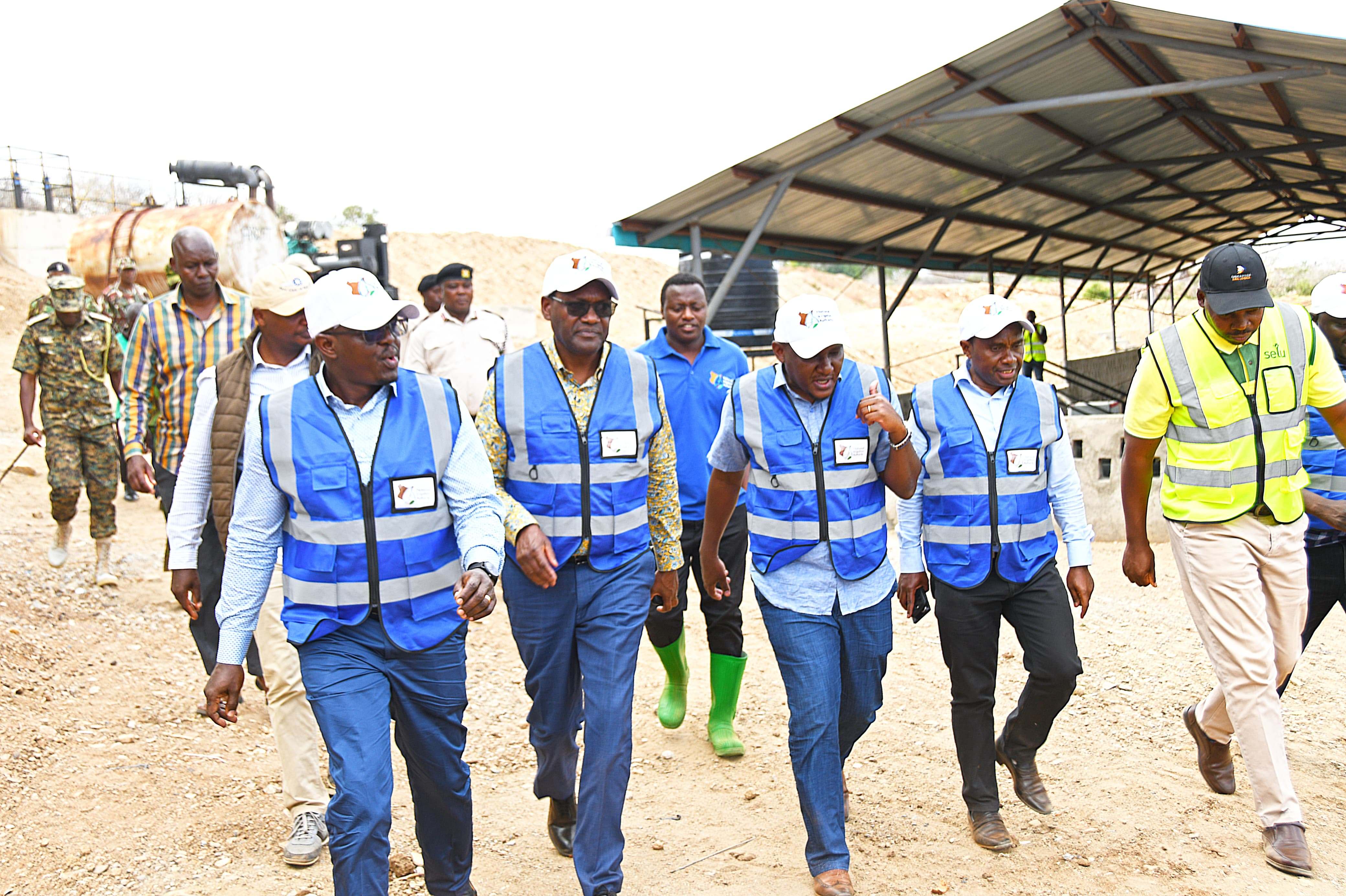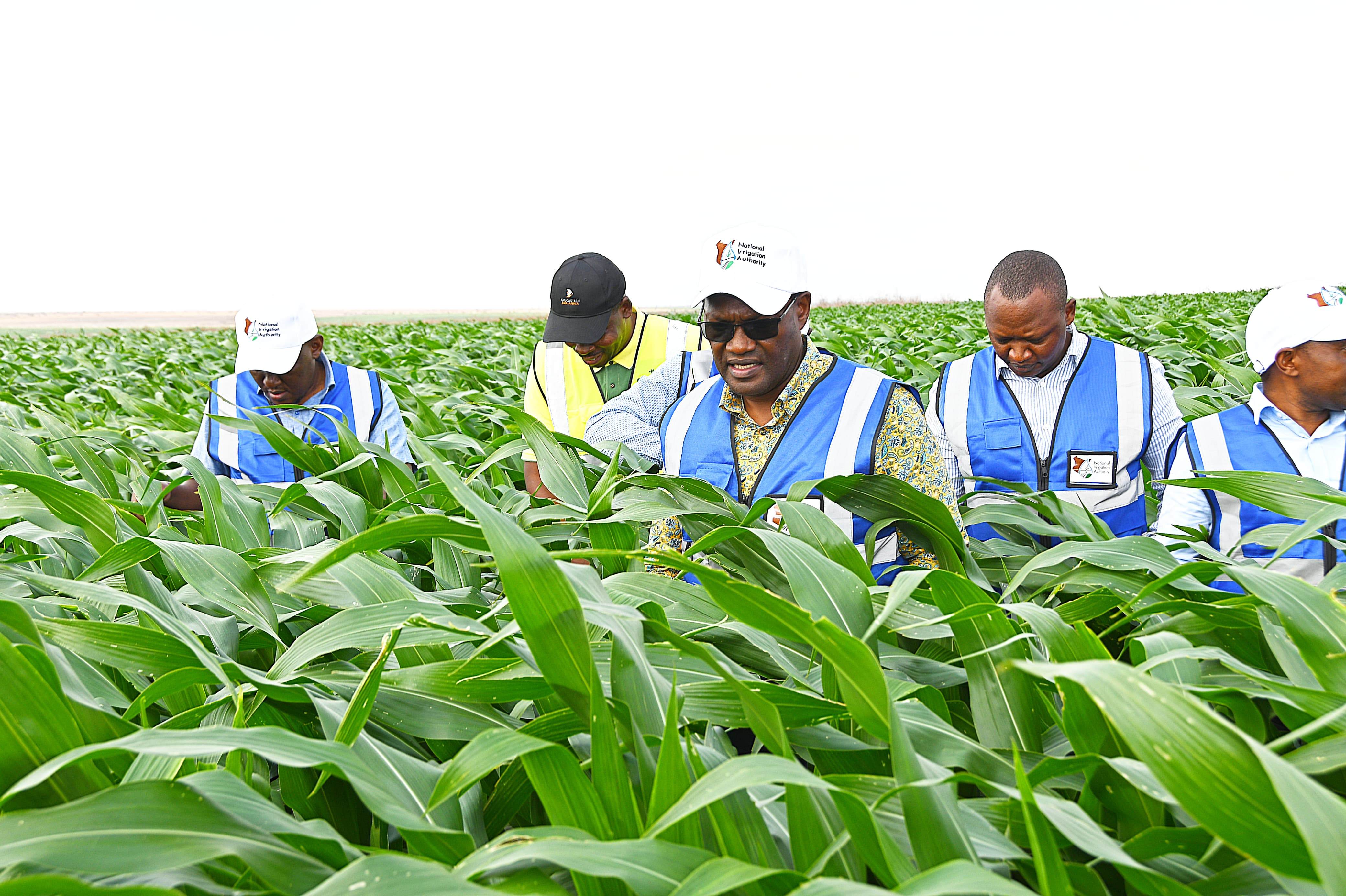

National Treasury PS Chris Kiptoo [2nd L]
and his Irrigation counterpart Ephantus Kimotho [3rd L] at Galana
Kulalu on Friday / BRIAN OTIENO

Irrigation PS Ephantus Kimotho [L] and his National
Treasury counterpart Chris Kiptoo [3rd L] at Galana Kulalu on Friday
/ BRIAN OTIENO
The construction of a Sh35 billion dam at the Galana Kulalu Irrigation project, which is expected to improve food security in the country, is about to begin.
Treasury PS Chris Kiptoo on Friday said already,
a contractor has been identified, and soon, they will be on the ground.
“The National Treasury and the Water, Sanitation,
and Irrigation ministries are working to ensure the project starts as soon as
possible,” Kiptoo said.
He spoke after touring the Galana Kulalu Irrigation
project with Irrigation PS Ephantus Kimotho.
The dam will be part of other investments done to
complement the commercial farming on the 1.5 million acres available at
Galana Kulalu.
Once operational, it will generate a sufficient
amount of water to attract more investors and encourage other government
agencies to invest in Galana, Kiptoo said.
Already, several private companies are on the ground
as the government uses the Public-Private Partnership model to spur development
in the country.
The mega irrigation project is about to go to the Condition
Precedent phase after successfully undergoing financial closure.
Selu Limited, in partnership with the National
Irrigation Authority, has now started early works in a bid to fulfill the Condition Precedent and finally do the financial close.
They will develop 20,000 acres for a period of 30
years, which will cost them about Sh12.5 billion
“The estimate is that if you put all these 20,000
acres under maize, every year they will be producing 70 bags per acre, which
translates to about 1.4 million bags per year," Kiptoo, who is the chair of the PPP model, said.
“If you sell at the current market prices of about
Sh4,000, that translates to about Sh5.6 billion per year.”
The PS said this is a good example of how the
country can deal with a diminishing fiscal space where the government cannot
finance projects through the budget, which is currently overwhelmed.
“We are increasingly asking for use of PPP, where
the projects are commercially viable. Clearly, this is an example of a
commercially viable project,” the PS said.
Already, Selu Limited has contracts for off-take of
the maize that is expected to mature in October, having been planted in May on
1,060 acres using nine pivots.
This is part of the first 10,000 acres that are expected
to be used in Phase One of the Galana Kulalu project.
PS Kiptoo said apart from improving food security,
the Galana Kulalu irrigation project will help reduce importation of cereals
and other foodstuffs, save foreign exchange and improve income for locals.
“Most importantly, many young men and women are
already employed by the project,” the Treasury PS said.
His Irrigation counterpart Ephantus Kimotho said
the second phase of the Galana Kulalu irrigation project started a year ago,
with the construction of a new intake.
“Initially, the project, which had been done before, had a challenge with the intake. The new intake is now helping us command at least
the initial 10,000 acres,” the Irrigation PS said.
Apart from the intake, Kimotho said, there is a
canal and a water reservoir that has a capacity of 600,000 cubic metres, which
have been constructed.
“That is the water that is helping in terms of
irrigation of the first 10,000 acres,” Kimotho said.
He said part of the Sh12.5 billion invested by
Selu Limited will go towards the construction of storage infrastructure, part will
be used for irrigation infrastructure, and part will be used to develop on farm
roads to facilitate the movement of goods in the farm.
The Kenya Rural Roads Authority, part of the multi-agency
team on the Galana Kulala project, is constructing a bridge, the Galana Bridge, which will help in improving access for delivering of farm inputs and movement of
goods.
“Right now, it is very challenging to move goods
around. We have to go all the way to Baricho bridge, which is 70km away,” Kimotho said.
As of July 31, the bridge was 50 per cent complete
and is expected to be complete by June next year.
Pumping of water that irrigates the 10,000 acres is being done by diesel.
In two months, however, Korean Solar,
contracted by Selu Ltd, will be installing solar panels that will be generating
at least 2.5MW of power, which will be used to power the pumps.
Kimotho said the Rural Electrification and Renewable Energy Corporation, through the Energy ministry, is putting up a power plant.
"From the statistics we had had last time, they said by next June, we should
be able to have the power,” he said.
This, he said, will ease the cost of production and
encourage investors to produce even more.
After all these are done in Phase Two, some 200,000 acres will be under irrigation.
“Then Phase Three, which will give us an additional 500,000 acres, will be done after we do the high grand fall, which is expected to
be done probably in the next five years,” Kimotho said.
PS Kiptoo said the water infrastructure works that
have been done so far at the Galana Kulalu project were funded by the government
at a cost of Sh519 million.
“When I look at the work that has been done compared to the money that we gave them, I can say there is value for money,” he said.
INSTANT ANALYSIS
The Galana Kulalu project is part of Kenya Kwanza’s Bottom-Up Economic Transformation Agenda, focusing on food security, reducing food imports and increasing exports. The National Irrigation Authority is working with private partners to implement the necessary infrastructure, including irrigation systems and a large dam.















